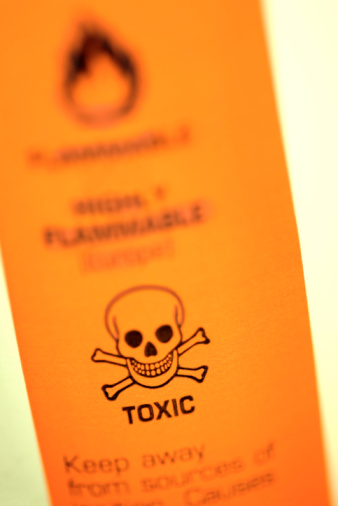The bad news: We live in a toxic world. There are all kinds of nasty foreign substances all around us, from heavy metals to plastics (otherwise known as phthalates) to pesticides, solvents, molds, and other fat- and water-soluble chemicals. It isn’t really possible to avoid toxins completely unless you want to pick up and move to some unindustrialized part of the world... and even then there’s no guarantees.

The question isn’t whether we are toxic - we all are, to some extent. The question is whether the toxins we’ve accumulated contribute to our health problems or not. Some people are more susceptible than others, based on how efficiently their livers and kidneys can neutralize and excrete toxins. But whether your organs of elimination are awesome or not, it’s a good idea to avoid exposure as much as possible.
The good news: yes, the world is toxic, but you’re not completely powerless. A little bit of education can go a long way. In this article, I focus on cleaning products - one source of chemical exposure over which we do have some control.
Tips for Choosing Cleaning Products:
- Pay attention to warnings on the package. Many cleaning products, and even some touted as “green,” contain warnings that say “poison” or “fatal if swallowed or inhaled.” Others may warn that the product may severely burn eyes and skin, may cause blindness or death, that the vapors are harmful or that you must use the product only while wearing gloves. Some labels even say things like “contain a substance known in (such-and-such state) to cause cancer,” “probably carcinogenic to humans,” or “prolonged exposure may cause reproductive and fetal effects.” Do you want that stuff in your house, let alone in contact with your skin or lungs?
- Be careful of cleaning products with vague ingredients. Makers of cleaning products are not required to disclose their ingredients, and so many of them say things like “surfactant” or “solvent,” without specifying their chemical nature. Personally, I wonder what they’ve got to hide... particularly because there are so many chemicals that have been linked with certain diseases, and some that have even been banned in other countries.
- There’s a long list of all the specific ingredients you should try to avoid. But who’s going to remember all those names? (Even I have to look them up every time, and I’m a naturopathic doctor - I do this for a living.) My rule? If I don’t recognize the name of an ingredient, it doesn’t go in my mouth. Only slightly less important: if I don’t know what it is, it doesn’t go on my skin, in my hair, and it doesn’t belong in my house... if I can possibly come up with an alternative.
So what do you use instead? There are a number of green cleaning products available, although you should read those labels as well and subject them to the rules above as well, since some so-called green products are not as harmless as they claim. But here’s a few other easy household tricks:
- Clean your oven by sprinkling baking soda liberally on the bottom. Spray with water, wait eight hours, and then scrape and wipe the oven clean.
- In lieu of dryer sheets, use a humidifier if the air is dry. This will lower static electricity. Or, you can add vinegar to the rinse cycle, or run a damp cloth over clothing to achieve the same effect.
- If you must use cleaning products containing undisclosed or harmful chemicals for some reason, make sure you open a window, use a fan, or both.
- Instead of using air fresheners, many of which contain harmful chemicals, track down the source of the odor and eliminate it. Baking soda is also excellent for absorbing foul odors in enclosed spaces, such as in a bathroom.
But again, I must stress that it’s not possible to completely avoid all harmful substances, and it’s very possible to become obsessed with the attempt. That’s not healthy either. My advice? Be educated, be wise, but try not to be fearful. Do what you can do, and let the rest go.
Want a list of more specific chemicals to avoid? Here’s a great resource: http://www.ewg.org/
Dr Lauren Deville is board-certified to practice Naturopathic Medicine. To receive her free e-book, “Ten Nutritional Supplements Everyone Should Have,” or to receive her monthly health and wellness newsletter, please sign up at www.drlaurendeville.com.
